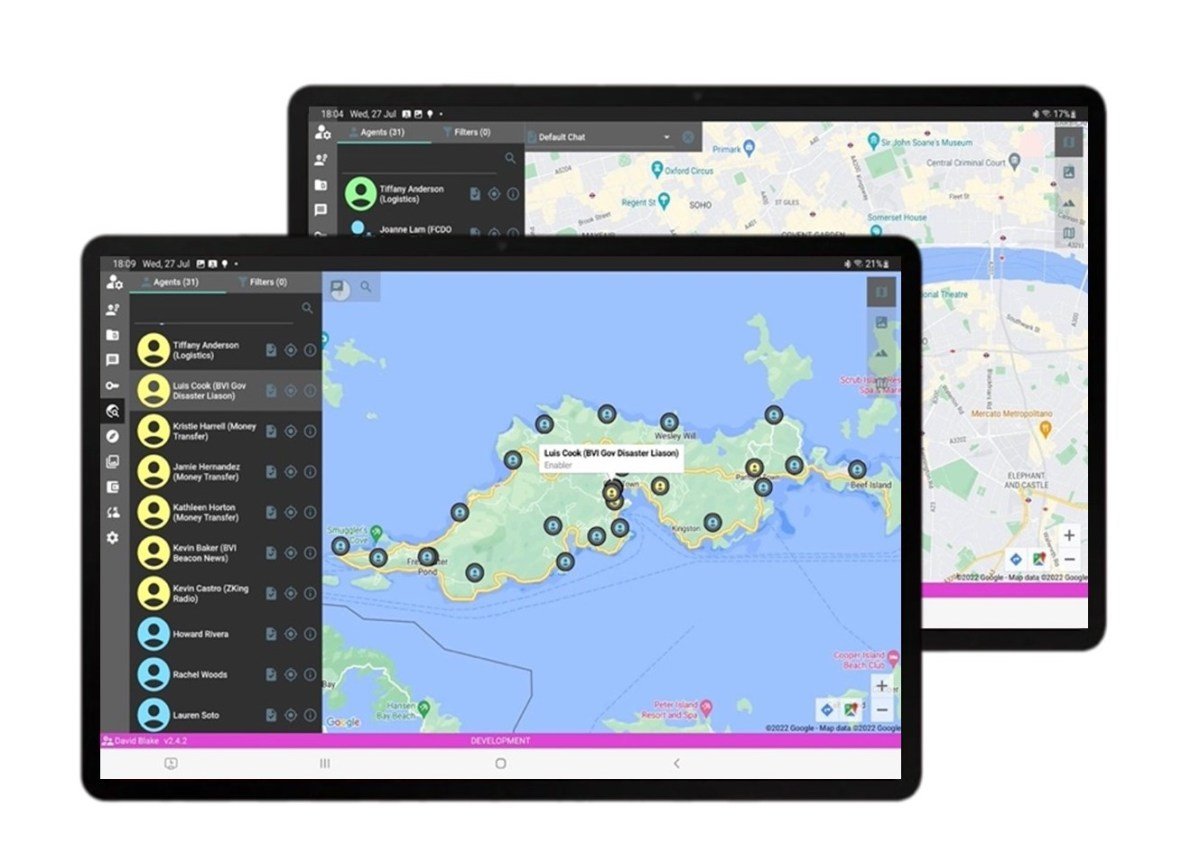When the startup Helsing successfully raised a $223 million Series B round, it was clear to the tech world that Defense was undeniably back on the investing agenda. But this isn’t the only confirmation. Today, Labrys Technologies, a UK defense tech startup, announced their own Seed round of $5.5 million, led by Germany’s Project A Ventures. Other investors include MD One Ventures, Marque VC, Offset Ventures, and Expeditions Fund. This new injection of funds will be used to expand their development and R&D teams, as well as build out their commercial sales team.
Labrys Technologies is essentially a combination of Slack, location tracking, and payments rolled into one platform for both military and humanitarian scenarios. Although this may seem like a complex concept, it becomes more understandable when you consider the problems it aims to solve.
WhatsApp – The Common Solution
What is commonly used in fast-moving situations like a humanitarian crisis is WhatsApp. And — declaring some interest in the subject — I have personal experience of this. From 2015 onwards, when I founded the Techfugees non-profit, we found that both refugees and humanitarian workers almost always used WhatsApp to coordinate a response. It was simple, worked over bad networks, was fast, and could reveal location. However, it’s limitations are all too obvious. How do you know you are dealing with a legitimate humanitarian worker? What if they don’t reveal their location? How can you get resources to them, or money? These are important problems to solve.
August Lersten, Co-founder and CEO of Labrys, explained in an interview: “WhatsApp is very problematic when it comes to managing large teams worldwide, because the communications are end-to-end encrypted. It can sometimes make it very difficult to actually validate and confirm who you’re actually speaking to on the other end of the line. And you can’t integrate all these different chats into what we describe as a network coordination tree. If I want to speak to 133 people in Indonesia, I don’t necessarily want to have 133 separate individual communications.”
Labrys offers a dashboard where users can message whole teams or individuals, similar to Slack or Microsoft Teams, and know their live location. Plus, there’s a method for payment.
The Labrys Team and Their Experience
Labrys was founded by Co-founders August Lersten and Luke Wattam. Lersten has a background in the UK’s Ministry of Defence, FCDO, and UK allies. Wattam is a former Royal Marine Commando who has led teams across Africa, the Middle East, and Asia. Their experience in the field provided firsthand knowledge of the need for a platform like Labrys.
The Labrys Platform
The Labrys platform includes two components – Axiom C2 and Axiom Communicator. It allows for KYC/E verification, encrypted communications, task management, and geo-location for individual users. It also offers digital payments through Crypto stablecoins. In other words, Labrys can verify who users are, their location, and provide a method for payment – crucial features for dealing with humanitarian disasters.
Lersten commented on the effectiveness of the platform: “I see my people via a geospatial interface. Having that interface is a differentiation as against things like WhatsApp and Slack and other communication channels. The second component is communication with those dots, wherever they are, say, in Afghanistan. And then I want to pay my workforce. I can pay them in US Dollar Stable coins all through the same interface.”
The platform has already been put to the test in the field and has proven successful. It was used in Afghanistan to assist in the evacuation of 5,000 persecuted Afghan minorities and by the Ukrainian State Emergency Services during the Kakhovka Dam breach.
The Growing Market
Labrys operates in a unique and fast-growing market, with multiple civilian and military solutions overlapping. For example, Everbridge is an enterprise software solution that provides users, often military and NGOs, with an understanding of global flashpoints. However, unlike Labrys, it does not have a feature to connect with individuals on the ground. Another market competitor, TAK, is known as a “Blue Force” tracking system. And Premise Data, which has received $146 million in funding, offers a software platform for humanitarian organizations and provides analytics about assets on the ground.
In 2022, the global Command and Control Systems market was estimated at $22 billion and is expected to reach $28 billion in 2028. Plus, companies like Improbable, EclecticIQ, Living Optics, and Preligens, all based in Europe, have raised millions of dollars in funding in the past year.
Investors Taking Notice
Labrys’ latest Seed round is one of the largest for a defense tech startup in Europe to date. This is a clear indication that Defense is no longer off-limits for investors, as we saw this year during TechCrunch Disrupt. These types of “dual-use” products that coordinate civilian and military teams are in high demand. In 2020, VC-backed firms injected $7 billion into aerospace and defense companies in the US.
Mykola Taranenko, Commander of the Kherson Regional Rapid Response Team with the Ukrainian Red Cross and a Labrys client, shared his thoughts via email: “As a commander, I always need to see where my team is when they are on a mission – especially in a high-risk environment like Ukraine. With the help of Axiom, I can securely monitor my team’s location and status, manage donations, quickly convert digital payments into real-world impact, purchase equipment locally, and donors can see where their money has gone.”








